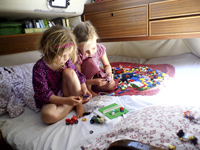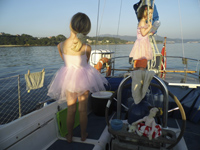
 |
||
About Articles Quotes Editor's Blog |
||
|
Learning from Dolphins:
|
 |
Craft, drawing, and painting materials, LEGO, a dressing-up bag, fuzzy felt, play dough, musical instruments, and a few too many dolls and teddies fill the boat, and the girls play imaginatively together when we are sailing and at anchor.
We use what resources we have in order to learn. The children make little distinction between their “age appropriate”’ story books and “grown-up” reference books, cook books, field guides, and so on, pouring over both in equal measure. Now that Lily is an independent reader, she attempts to read everything – in English or Spanish – hungry to understand every word she sees. At random times, when we are in the mood, we practice math or reading or writing. We have discovered the girls prefer writing with a purpose, so letters and postcards written to grandparents and other family members, and shopping lists are currently their main writing activities. Much of Katie’s reading and writing thus far seems to have been learned from Lily, who takes it upon herself to actively teach her sister.
We are learning Spanish together, all using the same Spanish for Beginners book, helping each other with grammar and vocabulary, and taking every opportunity to practice our nascent language skills. I hear Lily and Katie talking, with varying degrees of success, to Spanish children in playgrounds and on beaches, and we all try to communicate in Spanish with the people we meet each day.
Day-to-day living in a confined space with limited fresh water and energy takes more time than living in a house. Laundry is hand-washed in buckets, and hung to dry along the rails that run around the boat. With some ingenuity, we cook and bake all our favorite foods using our small oven and two-burner hob, in our minuscule kitchen. My husband takes responsibility for maintenance and repair of the engine, sails, dinghy, and so much more. All of these daily tasks take place in close proximity to one another, and we all participate to some extent, assisting and helping when required. The children help with laundry, cooking, and baking, and they love to scrub the decks! When we sail, they take the helm when the sea is calm, and they are learning to row the dinghy. As they grow older, I hope they will take an interest in engine mechanics and rigging.
Despite our tight budget, every day we experience new places and have new adventures, exploring the world as a family. Everything we do provides opportunities for learning, and much of our learning is organic and unplanned. It is evident that our children are learning all the time – from their reading, writing, and mathematical abilities, from the confidence they show in engaging with others, and from their growing independence and practical abilities. But from time to time I still find myself questioning whether unschooling is enough.
Unschooling the Adults
When I was twenty-one years old, studying for a Masters Degree in Anthropology, I studied the writings of Paulo Freire and Ivan Illich. Freire’s philosophy of politicized education and his empowerment of poor, landless Brazilians through meaningful education, combined with Illich’s powerful ideas about the institutionalizing role of formal education, moved me to reassess my own relationship with education. The research I conducted for my M.A. led me to question the way school curricula arbitrarily divide and separate subjects. I was exploring the way school children learn about global poverty and inequality, and I was struck by the fact that this topic was confined to Geography and Religious Studies. Why didn’t History, English Literature, Math, Economics, or Science also explore the issue of inequality? And, over time, I realized that the same was true for every topic. The boundaries around school subjects were arbitrary, and in my own life I knew my appreciation of literature was linked to my understanding of geography, history, or science; my knowledge of certain cultures was as much informed by poetry and great literature as it was by my anthropology text books; my appreciation for economics was linked to my shopping choices.
The philosophy and politics of Freire and Illich, combined with my desire to provide my own offspring with a more holistic education, led me to the decision to home educate my own children when they came along. It was another fifteen years before Lily was born, but my conviction remained strong.
But despite that conviction and the evidence that my children are thriving in our unschooling environment, I find myself struggling to let go of my thirty-seven years in formal education. My own academic abilities have always been judged through meeting pre-set formal criteria, and I have judged my own students’ abilities in the same way. I have taught students from elementary school to post-graduate level, in Canada, Japan, Ireland, and the UK. No matter the level or the country, formal curricula are followed and attainment is measured through the meeting of specific and rigid examination criteria. Despite my misgivings about the arbitrariness of subject boundaries, the institutionalizing effects of formal education, and the limitations of testing, I have contributed to and been influenced by each one of these.
So, when I think about the way my husband and I have chosen to educate our daughters, I worry about how they will be judged by others. Are they learning the things they “need” to learn? Are they developing the skills they will need for adulthood? Should we live more structured lives? Should we follow a curriculum? Am I doing them a disservice by practicing life learning?
 |
Learning All the Time
To reassure myself that we are doing alright, I occasionally carry out a mental audit of our learning. I reflect on the past twenty-four hours, or on how we have developed particular skills over a given period of time. And here’s what I discover: All four of us are learning all the time, supporting and encouraging each other in our learning. We are all improving our abilities to sail and speak Spanish; we are all following our own interests – writing, drawing, sewing, singing; we are all learning about the culture and history of Spain; and about marine biology, oceanography, meteorology, astronomy, and the many other sciences that influence our lives each day.
Coming from different academic and cultural backgrounds, my husband and I have different skills and expertise to share with the children and each other. Listening to and participating in our everyday conversations, our children learn not only about the great variety of topics that interest us; they also learn skills of debate, argument, and lively conversation.
Despite being together most of the time, sailing necessitates independence and the development of practical skills. When we undertake long voyages of twenty-four hours or more, one adult is always on the helm and while the other one sleeps. The children, therefore, must be self-sufficient, taking responsibility for eating, sleeping, and keeping busy. The mere act of living aboard a boat leads to the development of certain kinetic and sensory skills.
Wherever the Wind Blows
The most reassuring aspect of life learning is observing how the children approach the world with interest and curiosity. Every encounter and experience fills them with questions. They have no arbitrary boundaries to their curiosity, no neat boxes into which different knowledges must be compartmentalized. This eclectic approach to learning works for them now and will do so later in life.
We long to sail the world, but our short-term goal is to winter in the Mediterranean. With each day and each mile I move farther away from formal education, as I open myself up to the possibilities of unschooling. My greatest teachers in this endeavor are undoubtedly my daughters, whose enthusiasm and curiosity about the world around them is the greatest reassurance of all that we have chosen the right course to sail.
Martina Tyrrell is an environmental anthropologist, writer, and unschooler. She lives aboard a sailing boat with her husband and two daughters.